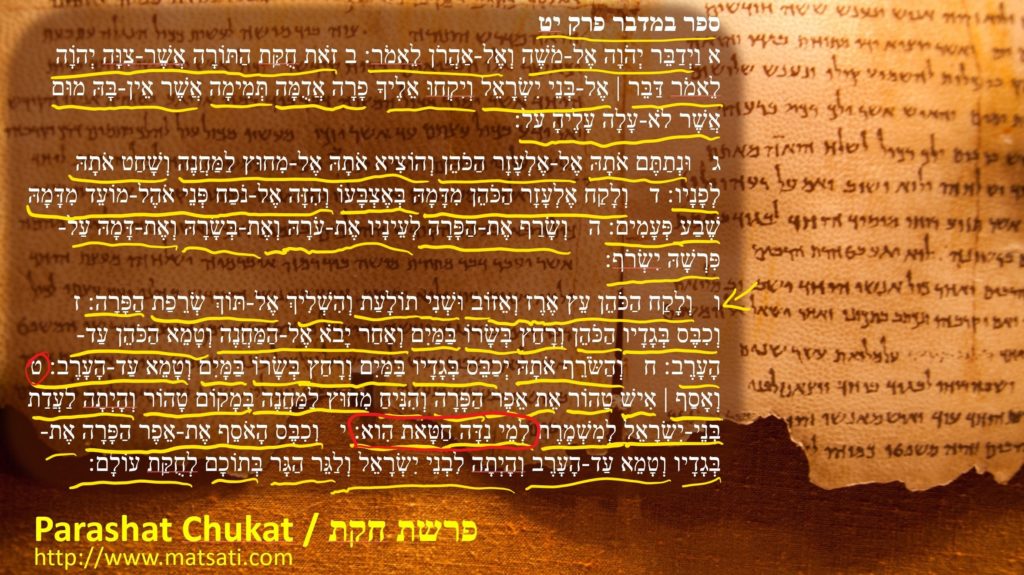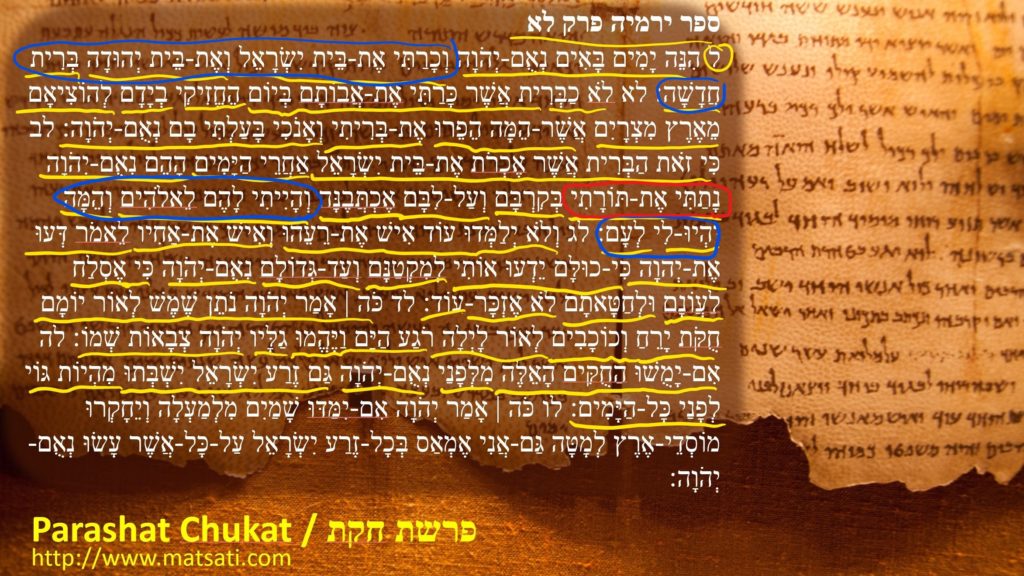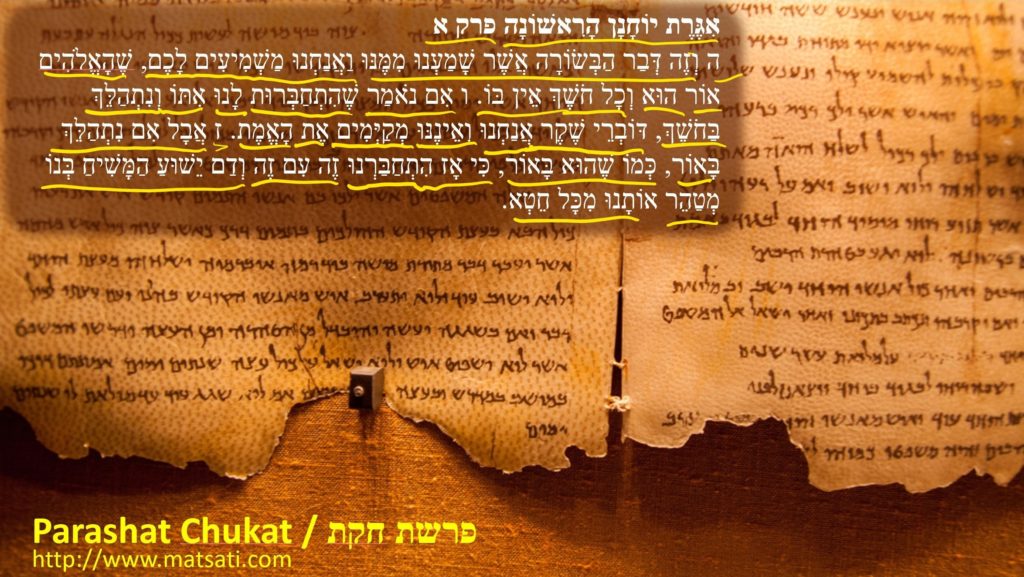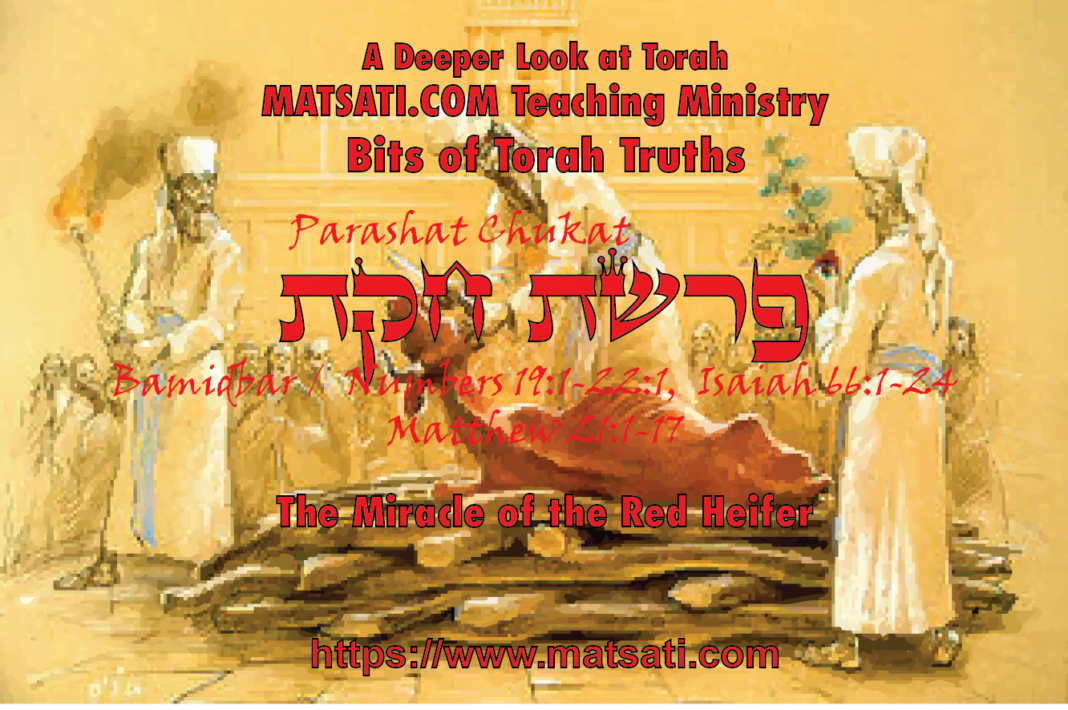In this week’s Torah Portion, Parashat Chukat, there is a lot that is going on. The reading for this week opens with the command regarding the Red Heifer and purification from impurity (19:1-22), the death of Miriam (20:1-6), the Waters of Meribah (20:8-22), the death of Aaron (20:23-29), Arad Conquered (21:1-6), the Bronze Serpent (21:6-20), conquering Sihon king of Amorotes and Og king of Bashan (21:21-35), and Balak Sends for Balaam (22:1). The opening verses from Bamidbar / Numbers 19:1-2 state the following, א וַיְדַבֵּר יְהֹוָה אֶל-מֹשֶׁה וְאֶל-אַהֲרֹן לֵאמֹר: ב זֹאת חֻקַּת הַתּוֹרָה אֲשֶׁר-צִוָּה יְהוָֹה לֵאמֹר דַּבֵּר | אֶל-בְּנֵי יִשְֹרָאֵל וְיִקְחוּ אֵלֶיךָ פָרָה אֲדֻמָּה תְּמִימָה אֲשֶׁר אֵין-בָּהּ מוּם אֲשֶׁר לֹא-עָלָה עָלֶיהָ עֹל: 19:1 Then the Lord spoke to Moses and Aaron, saying, 19:2 “This is the statute of the law which the Lord has commanded, saying, ‘Speak to the sons of Israel that they bring you an unblemished red heifer in which there is no defect and on which a yoke has never been mounted. (NASB) Here we learn about the Red Heifer. To meet the requirements of the Torah, a red heifer was needed to help accomplish the purification from physical impurity here on earth and is what is needed prior to entering into the Holy Temple in Jerusalem. Specifically, the ashes of a Red Heifer were needed. The Red Heifer was a cow of reddish (אֲדֻמָּה) color, it was to be “without defect or blemish” (אֲשֶׁר אֵין-בָּהּ מוּם) and to have never had a yoke placed upon her (לֹא-עָלָה עָלֶיהָ עֹל). The sacrifice of the Red Heifer was unique in the Torah from the sense that it was to be a פָרָה a female animal. Our text tells us that it was to be sacrificed away from the entrance to the Mishkhan (Tabernacle) and in fact, outside of the camp as the Tabernacle was situated in the center. This is the only sacrifice in which the color of the animal was specified explicitly! The Lord tells Moshe זֹאת חֻקַּת הַתּוֹרָה “this is a statute of the Torah” referring to the חקים (chukim, laws) of ritual defilement and subsequent rites of purification. We note that this is not necessarily a purification from sin as becoming ritually defiled does not necessarily involve a sinful act (see remainder of Bamidbar / Numbers 19). The example of such is illustrated by the Torah on contracting ritual impurity through touching the dead. The ashes of the Red Heifer were used to purify one from uncleanness and so this reveals to us how the ashes of the Red Heifer were to function. We note also how the command on the Red Heifer was given to the people on the first day of Nissan on the day the Mishkhan was erected and made ready for service. (see Talmud Bavli Gittin 60, Chizkuni on Bamidbar / Numbers 19:2, Part 1). The reason this was important is the instrument or person who was not cleansed by the ashes of the Red Heifer could not take part in the services. Note the timing of the putting together of the Mishkhan, this was the month of Nissan, the Torah specified first month of the new year. So without the purification rites, the Passover could not have been offered on the fourteenth day of Nissan.

Our text continues saying the following, ג וּנְתַתֶּם אֹתָהּ אֶל-אֶלְעָזָר הַכֹּהֵן וְהוֹצִיא אֹתָהּ אֶל-מִחוּץ לַמַּחֲנֶה וְשָׁחַט אֹתָהּ לְפָנָיו: ד וְלָקַח אֶלְעָזָר הַכֹּהֵן מִדָּמָהּ בְּאֶצְבָּעוֹ וְהִזָּה אֶל-נֹכַח פְּנֵי אֹהֶל-מוֹעֵד מִדָּמָהּ שֶׁבַע פְּעָמִים: ה וְשָֹרַף אֶת-הַפָּרָה לְעֵינָיו אֶת-עֹרָהּ וְאֶת-בְּשָֹרָהּ וְאֶת-דָּמָהּ עַל-פִּרְשָׁהּ יִשְֹרֹף: 19:3 And you shall give it to Eleazar the priest, and it shall be brought outside the camp and be slaughtered in his presence. 19:4 And Eleazar the priest shall take some of its blood with his finger and sprinkle some of its blood toward the front of the tent of meeting seven times. 19:5 Then the heifer shall be burned in his sight; its hide, its flesh, and its blood, with its refuse, shall be burned. (NASB) Note the burning up appears to be similar to the Olah Korban (Whole burnt offering) however it was not placed upon the altar and there was not select pieces taken, no special preparation of the cow, it was just burned whole. We are also told how Eleazar the Cohen HaGadol (High Priest) was to observe the entire process on the preparation of the waters of purification. We note what Aaron does first, וְלָקַח אֶלְעָזָר הַכֹּהֵן מִדָּמָהּ בְּאֶצְבָּעוֹ וְהִזָּה אֶל-נֹכַח פְּנֵי אֹהֶל-מוֹעֵד מִדָּמָהּ שֶׁבַע פְּעָמִים he takes from the blood and sprinkles it seven times in front of the Ohel Moed (אֹהֶל-מוֹעֵד, tent of meeting). This is an example for us as the blood was for purification ritual purposes only in the sense of the Mishkhan being purified or sanctified for service! It is questionable how could this be a sin offering when it is not burned upon the altar in the Tabernacle as the text says, וְהוֹצִיא אֹתָהּ אֶל-מִחוּץ לַמַּחֲנֶה וְשָׁחַט אֹתָהּ לְפָנָיו and וְשָֹרַף אֶת-הַפָּרָה לְעֵינָיו אֶת-עֹרָהּ וְאֶת-בְּשָֹרָהּ וְאֶת-דָּמָהּ עַל-פִּרְשָׁהּ יִשְֹרֹף the entire cow is burned, hide, flesh, and refuse, outside of the camp! Again, this is not a typical sin offering as it appears to be a whole burnt offering but it was not burned upon the altar in the Mishkhan.
The instructions on the Red Heifer continue saying the following, ו וְלָקַח הַכֹּהֵן עֵץ אֶרֶז וְאֵזוֹב וּשְׁנִי תוֹלָעַת וְהִשְׁלִיךְ אֶל-תּוֹךְ שְֹרֵפַת הַפָּרָה: ז וְכִבֶּס בְּגָדָיו הַכֹּהֵן וְרָחַץ בְּשָֹרוֹ בַּמַּיִם וְאַחַר יָבֹא אֶל-הַמַּחֲנֶה וְטָמֵא הַכֹּהֵן עַד-הָעָרֶב: ח וְהַשֹּׂרֵף אֹתָהּ יְכַבֵּס בְּגָדָיו בַּמַּיִם וְרָחַץ בְּשָֹרוֹ בַּמָּיִם וְטָמֵא עַד-הָעָרֶב: ט וְאָסַף | אִישׁ טָהוֹר אֵת אֵפֶר הַפָּרָה וְהִנִּיחַ מִחוּץ לַמַּחֲנֶה בְּמָקוֹם טָהוֹר וְהָיְתָה לַעֲדַת בְּנֵי-יִשְֹרָאֵל לְמִשְׁמֶרֶת לְמֵי נִדָּה חַטָּאת הִוא: י וְכִבֶּס הָאֹסֵף אֶת-אֵפֶר הַפָּרָה אֶת-בְּגָדָיו וְטָמֵא עַד-הָעָרֶב וְהָיְתָה לִבְנֵי יִשְֹרָאֵל וְלַגֵּר הַגָּר בְּתוֹכָם לְחֻקַּת עוֹלָם: 19:6 And the priest shall take cedar wood, hyssop, and scarlet material, and throw it into the midst of the burning heifer. 19:7 The priest shall then wash his clothes and bathe his body in water, and afterward come into the camp; but the priest will be unclean until evening. 19:8 The one who burns the heifer shall also wash his clothes in water and bathe his body in water, and will be unclean until evening. 19:9 Now a man who is clean shall gather up the ashes of the heifer and put them outside the camp in a clean place, and the congregation of the sons of Israel shall keep them for water to remove impurity; it is purification from sin. 19:10 And the one who gathers the ashes of the heifer shall wash his clothes and will be unclean until evening; and it shall be a permanent statute for the sons of Israel and for the stranger who resides among them. (NASB) Part of the procedure for the burning of the Heifer was to include cedar wood, hyssop, and scarlet material. After this Eleazar is to וְכִבֶּס בְּגָדָיו הַכֹּהֵן וְרָחַץ בְּשָֹרוֹ בַּמַּיִם וְאַחַר יָבֹא אֶל-הַמַּחֲנֶה וְטָמֵא הַכֹּהֵן עַד-הָעָרֶב take off his cloths and wash and be unclean until evening. This procedure is also to be followed by the one who set fire and burned up the Red Heifer (וְהַשֹּׂרֵף אֹתָהּ יְכַבֵּס בְּגָדָיו בַּמַּיִם וְרָחַץ בְּשָֹרוֹ בַּמָּיִם וְטָמֵא עַד-הָעָרֶב). Then a man who is clean is to gather up the ashes (וְאָסַף | אִישׁ טָהוֹר אֵת אֵפֶר הַפָּרָה) and put in a clean place and the one who gathered the ashes will be unclean until evening. It is interesting how these ashes were kept outside of the camp. It is also interesting how one becomes unclean by touching the ashes. But when mixed with water, the priest uses this mixture for purification from impurity. The Torah teaches us that the ashes of a red heifer must be used to purify one before they can enter the Holy Temple. The Scriptures state literally, וְהָיְתָה לַעֲדַת בְּנֵי-יִשְֹרָאֵל לְמִשְׁמֶרֶת לְמֵי נִדָּה חַטָּאת הִוא “this will be for the congregation of the sons of Israel to keep for water of niddah (menstrual / ritual impurity) from sin.” It is interesting how the Torah describes this sin as cleansing the level of sin as paralleling a menstrual cycle which imputes uncleanness for a woman. We note again how impurity can be the result of a variety of factors. The rabbis describe the most severe factor of all is that which is brought on by exposure to death. The impurity requiring cleansing was most commonly concerned with some aspect of death, either of a human being or another life form; or with sickness. The reason being as righteousness or sin corresponds to life or death. Ritual purity is a concept which is central to the subject of the life and service to God not just in the Holy Temple but also in our day to day lives!
The verses we are looking at for this week’s study are from Bamidbar / Numbers 19:1-10.
ספר במדבר פרק יט
א וַיְדַבֵּר יְהֹוָה אֶל-מֹשֶׁה וְאֶל-אַהֲרֹן לֵאמֹר: ב זֹאת חֻקַּת הַתּוֹרָה אֲשֶׁר-צִוָּה יְהוָֹה לֵאמֹר דַּבֵּר | אֶל-בְּנֵי יִשְֹרָאֵל וְיִקְחוּ אֵלֶיךָ פָרָה אֲדֻמָּה תְּמִימָה אֲשֶׁר אֵין-בָּהּ מוּם אֲשֶׁר לֹא-עָלָה עָלֶיהָ עֹל: ג וּנְתַתֶּם אֹתָהּ אֶל-אֶלְעָזָר הַכֹּהֵן וְהוֹצִיא אֹתָהּ אֶל-מִחוּץ לַמַּחֲנֶה וְשָׁחַט אֹתָהּ לְפָנָיו: ד וְלָקַח אֶלְעָזָר הַכֹּהֵן מִדָּמָהּ בְּאֶצְבָּעוֹ וְהִזָּה אֶל-נֹכַח פְּנֵי אֹהֶל-מוֹעֵד מִדָּמָהּ שֶׁבַע פְּעָמִים: ה וְשָֹרַף אֶת-הַפָּרָה לְעֵינָיו אֶת-עֹרָהּ וְאֶת-בְּשָֹרָהּ וְאֶת-דָּמָהּ עַל-פִּרְשָׁהּ יִשְֹרֹף: ו וְלָקַח הַכֹּהֵן עֵץ אֶרֶז וְאֵזוֹב וּשְׁנִי תוֹלָעַת וְהִשְׁלִיךְ אֶל-תּוֹךְ שְֹרֵפַת הַפָּרָה: ז וְכִבֶּס בְּגָדָיו הַכֹּהֵן וְרָחַץ בְּשָֹרוֹ בַּמַּיִם וְאַחַר יָבֹא אֶל-הַמַּחֲנֶה וְטָמֵא הַכֹּהֵן עַד-הָעָרֶב: ח וְהַשֹּׂרֵף אֹתָהּ יְכַבֵּס בְּגָדָיו בַּמַּיִם וְרָחַץ בְּשָֹרוֹ בַּמָּיִם וְטָמֵא עַד-הָעָרֶב: ט וְאָסַף | אִישׁ טָהוֹר אֵת אֵפֶר הַפָּרָה וְהִנִּיחַ מִחוּץ לַמַּחֲנֶה בְּמָקוֹם טָהוֹר וְהָיְתָה לַעֲדַת בְּנֵי-יִשְֹרָאֵל לְמִשְׁמֶרֶת לְמֵי נִדָּה חַטָּאת הִוא: י וְכִבֶּס הָאֹסֵף אֶת-אֵפֶר הַפָּרָה אֶת-בְּגָדָיו וְטָמֵא עַד-הָעָרֶב וְהָיְתָה לִבְנֵי יִשְֹרָאֵל וְלַגֵּר הַגָּר בְּתוֹכָם לְחֻקַּת עוֹלָם:
Bamidbar / Numbers 19:1-10
19:1 Then the Lord spoke to Moses and Aaron, saying, 19:2 “This is the statute of the law which the Lord has commanded, saying, ‘Speak to the sons of Israel that they bring you an unblemished red heifer in which there is no defect and on which a yoke has never been mounted. 19:3 And you shall give it to Eleazar the priest, and it shall be brought outside the camp and be slaughtered in his presence. 19:4 And Eleazar the priest shall take some of its blood with his finger and sprinkle some of its blood toward the front of the tent of meeting seven times. 19:5 Then the heifer shall be burned in his sight; its hide, its flesh, and its blood, with its refuse, shall be burned. 19:6 And the priest shall take cedar wood, hyssop, and scarlet material, and throw it into the midst of the burning heifer. 19:7 The priest shall then wash his clothes and bathe his body in water, and afterward come into the camp; but the priest will be unclean until evening. 19:8 The one who burns the heifer shall also wash his clothes in water and bathe his body in water, and will be unclean until evening. 19:9 Now a man who is clean shall gather up the ashes of the heifer and put them outside the camp in a clean place, and the congregation of the sons of Israel shall keep them for water to remove impurity; it is purification from sin. 19:10 And the one who gathers the ashes of the heifer shall wash his clothes and will be unclean until evening; and it shall be a permanent statute for the sons of Israel and for the stranger who resides among them. (NASB)
We note again how the Torah portion opens saying, זֹאת חֻקַּת הַתּוֹרָה אֲשֶׁר-צִוָּה יְהוָֹה “this is the statute of the Torah that God commanded.” When trying to understand the purpose for a command, when a command is listed as a statute (חֻקַּת) it means that we don’t always understand the reasoning behind the command. Due to this and the illogical nature of the water and the ashes of red heifer making one ritually pure, the rabbis say this is the reason the Red Heifer was considered a חֻקַּת (statute). The reasons being, the evil one tries to dissuade men and women from keeping God’s commandments which they do not fully understand. For example the nation’s ridicule Israel by reason of making fun of the Commands, disregarding the Commands, or considering the Commands of God of no consequence. It is interesting how this very same thing goes on not just among the nations but in the midst of the doctrines and theologies of the church today. The rabbis say the nation’s may ridicule this particular command wondering what is with this command on the Red Heifer? This is why the Torah uses the word statute (חֻקַּת) in connection to the command where the rabbis say “it is a decree from before Me and you have no permission to question it” (Talmud Bavli Chukath 7 and Yoma 67b) meaning that God said it and that is the extent of it, we are to do it! The rabbis describe the reason the Red Heifer was slaughtered outside the camp was to remove the spirit of impurity, and the burning outside the camp was a sweet savor unto God. (Ramban on Bamidbar / Numbers.19:2 Part 1) This is a significant conclusion on וְהוֹצִיא אֹתָהּ אֶל-מִחוּץ לַמַּחֲנֶה וְשָׁחַט אֹתָהּ לְפָנָיו (outside the camp) where the rabbis draw out a spiritual aspect of ritual impurity due to this requirement of taking the animal outside the camp. Ramban says “the reason for the impurity that is conveyed by a corpse is due to man’s sin committed through the instigation of the serpent” which then led to death. The reason being, if Adam had not sinned, he would have never died! Note that in the Torah, this completes the commands for the priests as much as what we read according to Sefer Vayikra (book of Leviticus). These things however are written so that we understand the purification of Israel must be effected through the priest, just as atonement for sins through the priest bearing the sins of the one who brings the offering. This is why the author of Hebrews argued for the heavenly priesthood of Yeshua in Hebrews chapter 8. This is also why we read what we do according to Bamidbar / Numbers 19:10, וְהָיְתָה לִבְנֵי יִשְֹרָאֵל וְלַגֵּר הַגָּר בְּתוֹכָם לְחֻקַּת עוֹלָם “and this shall be for the children of Israel, and for the stranger in your midst as an everlasting statute.” This command on the Red Heifer is an everlasting / eternal command!
The torat (תורת) on the instruction of ritual purity, especially in light of becoming impure by touching the dead, reveals to us how those who serve in the Mishkhan (Tabernacle) serve a living God and not a god of the dead. This is why Yeshua used this as an arguing point with the Sadducees saying God is not the God of the dead. (Mark 12:27, אֵין הוּא אֱלֹהֵי הַמֵּתִים כִּי אִם אֱלֹהֵי הַחַיִּים). Take for example what we read according to the prophet Jeremiah.
ספר ירמיה פרק לא
כט כִּי אִם-אִישׁ בַּעֲוֹנוֹ יָמוּת כָּל-הָאָדָם הָאֹכֵל הַבֹּסֶר תִּקְהֶינָה שִׁנָּיו:
Jeremiah 31:30
31:30 ‘But everyone will die for his own iniquity; each man who eats the sour grapes, his teeth will be set on edge. (NASB)
This verse parallels what we are reading here, sinning which leads to death is like eating sour (dead) grapes. The counterpart to this is walking in God’s ways and eating ripe fruit and life. This is why our God is the Living God! Jeremiah is describing God’s ways as truth and life for His people! Note how this is written just prior to the covenant promise in Jeremiah 31:29.

ספר ירמיה פרק לא
ל הִנֵּה יָמִים בָּאִים נְאֻם-יְהֹוָה וְכָרַתִּי אֶת-בֵּית יִשְֹרָאֵל וְאֶת-בֵּית יְהוּדָה בְּרִית חֲדָשָׁה: לא לֹא כַבְּרִית אֲשֶׁר כָּרַתִּי אֶת-אֲבוֹתָם בְּיוֹם הֶחֱזִיקִי בְיָדָם לְהוֹצִיאָם מֵאֶרֶץ מִצְרָיִם אֲשֶׁר-הֵמָּה הֵפֵרוּ אֶת-בְּרִיתִי וְאָנֹכִי בָּעַלְתִּי בָם נְאֻם-יְהֹוָה: לב כִּי זֹאת הַבְּרִית אֲשֶׁר אֶכְרֹת אֶת-בֵּית יִשְֹרָאֵל אַחֲרֵי הַיָּמִים הָהֵם נְאֻם-יְהֹוָה נָתַתִּי אֶת-תּוֹרָתִי בְּקִרְבָּם וְעַל-לִבָּם אֶכְתֲּבֶנָּה וְהָיִיתִי לָהֶם לֵאלֹהִים וְהֵמָּה יִהְיוּ-לִי לְעָם: לג וְלֹא יְלַמְּדוּ עוֹד אִישׁ אֶת-רֵעֵהוּ וְאִישׁ אֶת-אָחִיו לֵאמֹר דְּעוּ אֶת-יְהֹוָה כִּי-כוּלָּם יֵדְעוּ אוֹתִי לְמִקְטַנָּם וְעַד-גְּדוֹלָם נְאֻם-יְהֹוָה כִּי אֶסְלַח לַעֲוֹנָם וּלְחַטָּאתָם לֹא אֶזְכָּר-עוֹד: לד כֹּה | אָמַר יְהֹוָה נֹתֵן שֶׁמֶשׁ לְאוֹר יוֹמָם חֻקֹּת יָרֵחַ וְכוֹכָבִים לְאוֹר לָיְלָה רֹגַע הַיָּם וַיֶּהֱמוּ גַלָּיו יְהֹוָה צְבָאוֹת שְׁמוֹ: לה אִם-יָמֻשׁוּ הַחֻקִּים הָאֵלֶּה מִלְּפָנַי נְאֻם-יְהֹוָה גַּם זֶרַע יִשְֹרָאֵל יִשְׁבְּתוּ מִהְיוֹת גּוֹי לְפָנַי כָּל-הַיָּמִים: לו כֹּה | אָמַר יְהֹוָה אִם-יִמַּדּוּ שָׁמַיִם מִלְמַעְלָה וְיֵחָקְרוּ מוֹסְדֵי-אֶרֶץ לְמָטָּה גַּם-אֲנִי אֶמְאַס בְּכָל-זֶרַע יִשְֹרָאֵל עַל-כָּל-אֲשֶׁר עָשֹוּ נְאֻם-יְהֹוָה:
Jeremiah 31:30-36
31:30 ‘But everyone will die for his own iniquity; each man who eats the sour grapes, his teeth will be set on edge. 31:31 ‘Behold, days are coming,’ declares the Lord, ‘when I will make a new covenant with the house of Israel and with the house of Judah, 31:32 not like the covenant which I made with their fathers in the day I took them by the hand to bring them out of the land of Egypt, My covenant which they broke, although I was a husband to them,’ declares the Lord. 31:33 ‘But this is the covenant which I will make with the house of Israel after those days,’ declares the Lord, ‘I will put My law within them and on their heart I will write it; and I will be their God, and they shall be My people. 31:34 ‘They will not teach again, each man his neighbor and each man his brother, saying, ‘Know the Lord,’ for they will all know Me, from the least of them to the greatest of them,’ declares the Lord, ‘for I will forgive their iniquity, and their sin I will remember no more.’ 31:35 Thus says the Lord, Who gives the sun for light by day And the fixed order of the moon and the stars for light by night, Who stirs up the sea so that its waves roar; The Lord of hosts is His name: 31:36 ‘If this fixed order departs From before Me,’ declares the Lord, ‘Then the offspring of Israel also will cease From being a nation before Me forever.’ (NASB)
We note how important the covenant is that the Lord declares a new one that will be given, one which is founded upon the previous and yet different from the sense that He will write the commands of the Torah upon our hearts. (כִּי זֹאת הַבְּרִית אֲשֶׁר אֶכְרֹת אֶת-בֵּית יִשְֹרָאֵל אַחֲרֵי הַיָּמִים הָהֵם נְאֻם-יְהֹוָה נָתַתִּי אֶת-תּוֹרָתִי בְּקִרְבָּם וְעַל-לִבָּם אֶכְתֲּבֶנָּה) Notice how a new covenant does not do away with the Mosaic covenant! This is how we know that we serve an all powerful, all knowing, loving and merciful God who calls us to walk in His ways of mercy, love, righteousness, justice, and truth! Notice why Jeremiah 31:35 says what it does, drawing a parallel to the sun and the moon, the day and the night. Light is representative of God’s righteousness, just as we see according to the Creation account (Bereshit / Genesis 1) but also in walking in life and truth, just as Jeremiah says, God does not give His people sour grapes / death, but righteousness and holiness according to His Word.
Because of the holiness and righteousness of God, according to the Torah and the NT, we are called to live pure, holy, and righteous lives before God because of His presence in our lives. Yeshua during His ministry drew out the aspect of impurity due to sin in our hearts. While reading this week’s Torah Portion we are reminded about impurity in the preparation of the Waters of purification and the Red Heifer. Again, how the property of death (ashes mixed with water) can make one clean can be a bit confusing. We are told how Eleazar the priest becomes unclean (וְכִבֶּס בְּגָדָיו הַכֹּהֵן וְרָחַץ בְּשָֹרוֹ בַּמַּיִם וְאַחַר יָבֹא אֶל-הַמַּחֲנֶה וְטָמֵא הַכֹּהֵן עַד-הָעָרֶב) and the one who gathers the ashes becomes unclean (וְהַשֹּׂרֵף אֹתָהּ יְכַבֵּס בְּגָדָיו בַּמַּיִם וְרָחַץ בְּשָֹרוֹ בַּמָּיִם וְטָמֵא עַד-הָעָרֶב), these things reveal to us that one becomes unclean by reason of touching the ashes and these are to be kept outside the camp. Now when mixed with mayim khayim (living waters), the priest uses this mixture for purification from impurity. There may be something here the Lord is trying to teach us about sin and redemption. Sin leads to death and requires a miracle for our redemption! The requirement of taking the Red Heifer outside the camp draws a parallel to Yeshua as being crucified outside of the city, where His blood purifies from sin. This truth becomes even weightier as the rabbinic conclusions for the reason of taking the Red Heifer outside the camp was due to a spiritual aspect of ritual impurity. This is compounded by Yeshua drawing out the inner impurity, a spiritual malady, and how sin comes from one’s heart making one unclean from the inside out. This again is why so many places refer to God’s commands as life giving, just as Yeshua even said in John 12:50 And I know that His commandment is eternal life; therefore the things I speak, I speak just as the Father has told Me. (NASB, וַאֲנִי יוֹדֵעַ שֶׁמִּצְוָתוֹ חַיֵּי עוֹלָם. לָכֵן אֶת אֲשֶׁר אֲנִי מְדַבֵּר, כְּפִי שֶׁאָמַר לִי הָאָב כָּךְ אֲנִי מְדַבֵּר.״) The Commands of God are always put in light of righteousness, holiness, and truth, this is the vein of thought that John is drawing out according to his epistle in 1 John 5:5-7.

אִגֶּרֶת יוֹחָנָן הָרִאשׁוֹנָה פרק א
ה וְזֶה דְּבַר הַבְּשׂוֹרָה אֲשֶׁר שָׁמַעְנוּ מִמֶּנּוּ וַאֲנַחְנוּ מַשְׁמִיעִים לָכֶם, שֶׁהָאֱלֹהִים אוֹר הוּא וְכָל חֹשֶׁךְ אֵין בּוֹ. ו אִם נֹאמַר שֶׁהִתְחַבְּרוּת לָנוּ אִתּוֹ וְנִתְהַלֵּךְ בַּחֹשֶׁךְ, דּוֹבְרֵי שֶׁקֶר אֲנַחְנוּ וְאֵינֶנּוּ מְקַיְּמִים אֶת הָאֱמֶת. ז אֲבָל אִם נִתְהַלֵּךְ בָּאוֹר, כְּמוֹ שֶׁהוּא בָּאוֹר, כִּי אָז הִתְחַבַּרְנוּ זֶה עִם זֶה וְדַם יֵשׁוּעַ הַמָּשִׁיחַ בְּנוֹ מְטַהֵר אוֹתָנוּ מִכָּל חֵטְא.
1 John 1:5-7
1:5 This is the message we have heard from Him and announce to you, that God is Light, and in Him there is no darkness at all. 1:6 If we say that we have fellowship with Him and yet walk in the darkness, we lie and do not practice the truth; 1:7 but if we walk in the Light as He Himself is in the Light, we have fellowship with one another, and the blood of Jesus His Son cleanses us from all sin. (NASB)
Light is paralleled to righteousness, here John writes that if we are not walking in the light, we have no fellowship with God. It is also interesting how John says, 1:7 but if we walk in the Light as He Himself is in the Light, we have fellowship with one another, and the blood of Jesus His Son cleanses us from all sin. (NASB) The cleansing power of the blood of Yeshua is dependent upon walking in the light. This means living our lives in obedience to God’s commands. Remember it is only by the presence of God in our lives by His Spirit, that we are able to live in obedience to God’s commands. Note something also what Yeshua did to the disciples in the final chapters of the book of Luke. Luke 24:45 Then He opened their minds to understand the Scriptures (NASB, אָז פָּתַח אֶת לְבָבָם לְהָבִין אֶת הַכְּתוּבִים) Understanding these things has the requirement of God performing a miracle in our minds so that we can understand. Yeshua laying down His life for our purification outside of the city is paralleled to the Red Heifer and illustrates why we are have faith in Him for the salvation of our souls! Just as the Torah describes without purification it was impossible for one to go before God in the earthly Mishkhan (Tabernacle), without Yeshua, it is impossible to go before God in the heavenly Mishkhan! This is the essential reality and necessity of having faith in Yeshua in the life of God’s people!









